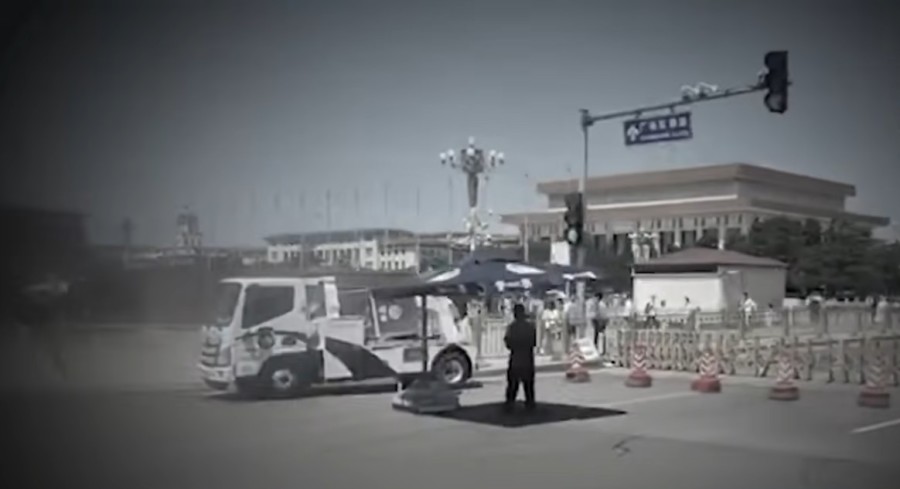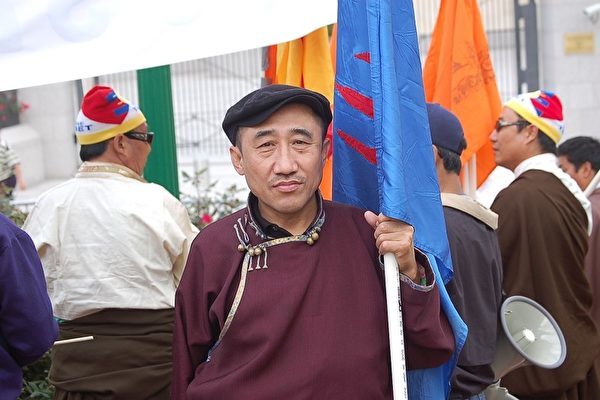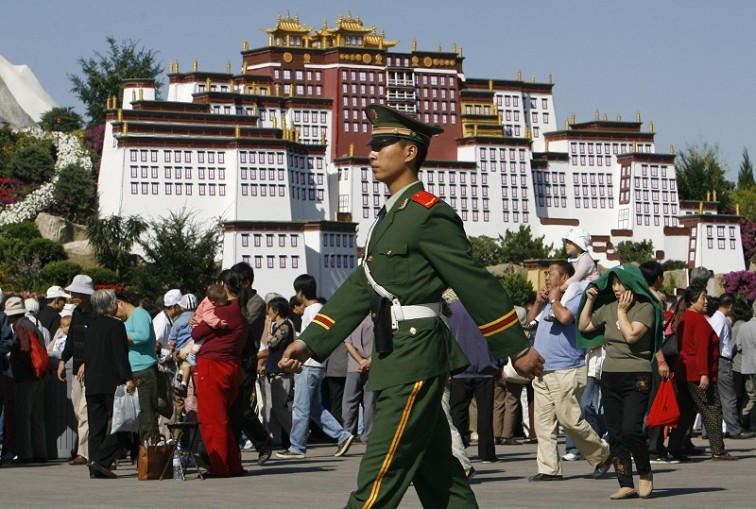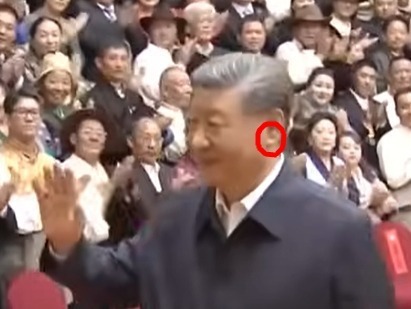Before the military parade scheduled for September 3, Beijing had already enforced stringent lockdown measures, with security personnel positioned every three steps and guards every five steps, creating an atmosphere of tension throughout the city. (Video screenshot)
[People News] In anticipation of the military parade on September 3, the Chinese Communist Party (CCP) has implemented extremely tight security measures in Beijing. The CCP did not foresee that, while monitoring the internet and the market, a 'toilet revolution' would quietly take root in the city. In reaction to public outcry, the authorities quickly introduced a 'real-name system' for public toilets, mandating that citizens register via WeChat or Alipay to use the facilities, which led to widespread outrage. Some netizens sarcastically commented, 'What kind of military parade can you hold when you're this scared?'
The CCP's greatest fear is the people
Recently, an X user named 'Nanyang Hui Shu Uncle Hui' shared a video and post stating: 'As the September 3 military parade draws near, security measures in Beijing are exceptionally tight. Security personnel are densely stationed around Tiananmen Square, almost every three steps; in subway carriages, a police officer and a police dog are assigned to every entrance and exit. To prevent petitioners from reaching Beijing, local governments have employed various methods to keep most petitioners confined to their local areas. The Beijing authorities have recently made a public call for a large number of temporary security personnel. A recruitment notice was posted on a university campus in Hebei, encouraging students to come to Beijing to serve as temporary auxiliary police, with tasks including apprehending petitioners, offering a daily wage of 150 yuan along with food and accommodation. Furthermore, dozens of individuals skilled in mobile photography have been recruited to monitor key areas such as utility poles, with both male and female security personnel involved. The work commenced on August 22 and is scheduled to last for 15 days.
The government continues to suppress petitioners to prevent them from voicing their grievances to higher authorities and spreading them among the public. The temporary auxiliary police that have been hired are also required to inspect each utility pole along the roads to stop anyone from posting slogans that could disseminate the truth. This truth has the potential to expose the Chinese Communist Party's (CCP) falsehoods and dispel the myths held by the populace. The truth serves as a powerful weapon that can awaken the public.
'Uncle Hui from Nanyang' further remarked, 'According to reports from Beijing citizens to the outside world, all buildings along Chang'an Avenue have completely ceased natural gas supply, and all communities are providing either dine-in or boxed meals. Residents living on the street are prohibited from opening their windows, and they must supervise each other. All vehicles, kitchen knives, hammers, and other sharp objects must be registered, particularly the fuel tanks of gasoline vehicles, which must be emptied. Outsiders are not allowed to stay overnight in Beijing, and local police stations and neighbourhood committees are required to organise personnel for continuous patrols. The preventive measures taken by the Beijing authorities have reached an extreme level of vigilance.'
He noted that security at the Beijing subway now involves 'one entrance, one police officer, and one dog, with security checks conducted as if facing a formidable enemy. The CCP is not afraid of terrorist attacks or bombs; it is afraid of the people.'
The CCP believes that with firewalls, internet police, and the surveillance of hundreds of millions of cameras, it can silence the public and prevent the dissemination of public opinion and truth. However, the CCP did not foresee: 'You have your clever strategies, and I have my ladder over the wall.' The people of Beijing, right under the watchful eyes of the police, are using public restrooms to write slogans, expressing their hatred and dissatisfaction with the CCP. A significant amount of anti-CCP information is spreading rapidly, which has been interpreted by the outside world as the 'toilet revolution,' causing panic within the CCP.
The 'toilet revolution' erupted just before the military parade.
According to a report by Apollo, as the Chinese Communist Party's "9.3 Military Parade" approaches, a so-called "toilet revolution" has emerged in Beijing. Numerous anti-Communist slogans have appeared on the walls of public restrooms, including messages like "The CCP should have perished long ago," "A century of enslavement must be overthrown," "Dictators step down," and "China needs democracy and the rule of law." In response, central districts of Beijing, such as Dongcheng, Xicheng, and Chaoyang, have surprisingly implemented a "real-name system for public toilets," requiring citizens to register via WeChat or Alipay to use the facilities, which has ignited public outrage. One netizen sarcastically remarked, "What kind of military parade can you have when you're this scared?"
Several photos circulating on the overseas social media platform X show slogans that even directly target Xi Jinping, stating, "93 aims at Xi Jinping." Analysts suggest that these protests are not random occurrences; rather, under the pressure of authoritarian rule and censorship, public dissatisfaction is increasingly manifesting in public spaces, with toilets becoming a last resort for expression. Netizens have humorously noted, "The only achievement of Xi in 13 years is the construction of many toilets." They added, "It wouldn't be surprising if the Communist Party installed cameras in toilets." Others referenced the Hangzhou sewage incident, quipping, "With 15 million people in Hangzhou and at least 10,000 toilets, if each toilet had a police officer, we would need at least 100,000 police to monitor them."
The so-called 'toilet revolution' began in 2018, not as the toilet renovation project touted by the Chinese Communist Party (CCP), but as a public outcry triggered by the scandal involving substandard vaccines harming children. Families affected by the scandal wrote slogans like 'Overthrow the Communist Party' and 'Down with the dictatorship' in hospital restrooms, and this movement gradually spread to children's hospitals in cities such as Beijing, Nanjing, Hangzhou, and Shanghai, evolving into a nationwide action. Dissident Ji Xiaolong urged democratic activists to write protest messages in restrooms of hospitals and universities, including phrases like 'Xi Fatty recklessly disperses money, amending the constitution to falsely claim the throne, when will the suffering end?'.
According to a report by Voice of America in June 2023, the 'toilet revolution' has persisted and become a distinctive form of grassroots resistance. It resonates with other protests, including the zero-COVID protests, the Sitong Bridge incident in 2022, 'Superman Brother' in Chongqing, the white paper movement, and the 2023 Nest Tower flyer action, creating an undercurrent of social resistance. Currently, the heightened control following the '9.3 military parade' has not only failed to quell public discontent but has also sparked a new wave of resistance.
Netizens have commented candidly: 'It’s becoming increasingly absurd; their financial expenditures are rising, and there will inevitably be a day of collapse.' Others remarked: 'Public restrooms have turned into a wall of democracy, which is exactly what the CCP fears the most.' △











News magazine bootstrap themes!
I like this themes, fast loading and look profesional
Thank you Carlos!
You're welcome!
Please support me with give positive rating!
Yes Sure!